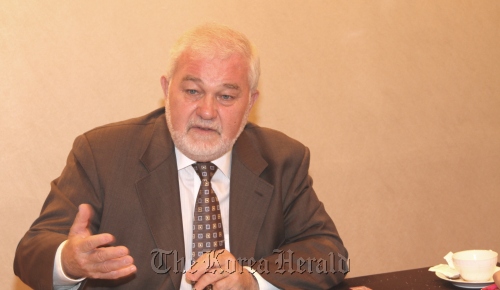German academic discusses crisis of capitalism, lessons from German reunification
A good mixture between market dynamics, prudent forms of NGOs, and more government regulations of the finance system could bring ideal reforms to modern-day capitalism, and such reforms often come from crisis and mass criticism, German scholar Jurgen Kocka said prior to the opening of 2011 Civilization and Peace Forum in Seoul, Monday.
“I am particularly interested in the crisis of capitalism which has repeated itself again and again,” Kocka told reporters. “If we look at previous cases, we see deep crisis of capitalism have produced hardship and misery. But at the same time, they triggered reforms in certain ways.”
The 70-year-old historian, who is the Permanent Fellow at the International Research Center Humboldt University in Berlin, is the key note speaker for the two-day forum in Seoul, with his speech titled “Benefits and Costs, Results of German Reunification after Two Decades.” He is also scheduled to give a lecture on Wednesday at the Academy of Korean Studies in Seongnam, Gyeonggi Province, about the crisis of capitalism in a historical perspective.
While arguing that economic crisis often brought necessary capitalist reforms in the past, the scholar pointed out the panic of 1873 triggered the rise of welfare state, while the Wall Street Crash of 1929 enabled the New Deal to take place in the U.S. between 1933 and 1936.
“Now the big question is will the crisis of financial system and capitalist economy in 2008, 2009, and 2010 help us reform the system?” he said.
A good mixture between market dynamics, prudent forms of NGOs, and more government regulations of the finance system could bring ideal reforms to modern-day capitalism, and such reforms often come from crisis and mass criticism, German scholar Jurgen Kocka said prior to the opening of 2011 Civilization and Peace Forum in Seoul, Monday.
“I am particularly interested in the crisis of capitalism which has repeated itself again and again,” Kocka told reporters. “If we look at previous cases, we see deep crisis of capitalism have produced hardship and misery. But at the same time, they triggered reforms in certain ways.”
The 70-year-old historian, who is the Permanent Fellow at the International Research Center Humboldt University in Berlin, is the key note speaker for the two-day forum in Seoul, with his speech titled “Benefits and Costs, Results of German Reunification after Two Decades.” He is also scheduled to give a lecture on Wednesday at the Academy of Korean Studies in Seongnam, Gyeonggi Province, about the crisis of capitalism in a historical perspective.
While arguing that economic crisis often brought necessary capitalist reforms in the past, the scholar pointed out the panic of 1873 triggered the rise of welfare state, while the Wall Street Crash of 1929 enabled the New Deal to take place in the U.S. between 1933 and 1936.
“Now the big question is will the crisis of financial system and capitalist economy in 2008, 2009, and 2010 help us reform the system?” he said.

Kocka also said civil movements and mass criticism of capitalism play an important role.
“If we look at previous cases in the past, criticism, protests and social movements were very important when bringing reforms as a consequence of crisis,” he said. “They are necessary to create the situation in which reforms are possible.”
The scholar gave four suggestions for the reform of present-day capitalism. They are: more government regulations on the finance system; less bailouts for banks, insurance companies, and big corporations; launching of social and tax policies against the growing disparity and inequality; and systemic measures to protect the environment.
Organized by the Academy of Korean Studies, the Civilization and Peace forum first started in 2005. The annual event discusses issues of peace focusing on Korean context and perspective, engaging scholars from both home and abroad.
This year’s theme is titled “Resolution of Conflict in Korea, East Asia and Beyond: Humanistic Approach.” Charles K. Armstrong of Columbia University will talk about principles for bringing permanent peace to the Korean Peninsula, while Tan Sor-hoon from National University of Singapore will delve into the theme of Confucian equality. Tan presents an interesting analysis on Confucian values, such as the “rule of virtue,” and “promoting the worthy and capable,” arguing Confucian meritocracy, unlike many would believe, does not approve of capitalist inequalities.
The two-day event is held at the Plaza Hotel in central Seoul, from Oct.10- 11.
By Claire Lee (dyc@heraldcorp.com)


















![[Today’s K-pop] Treasure to publish magazine for debut anniversary](http://res.heraldm.com/phpwas/restmb_idxmake.php?idx=642&simg=/content/image/2024/07/26/20240726050551_0.jpg&u=)